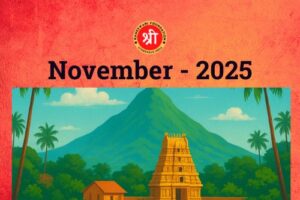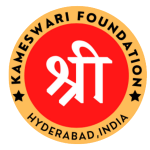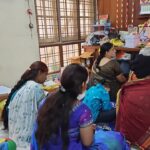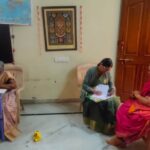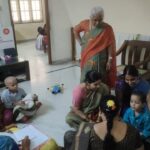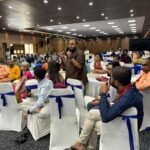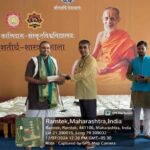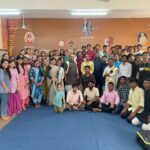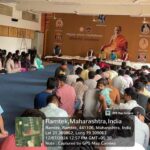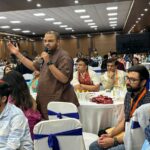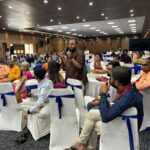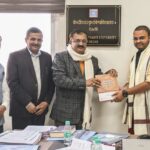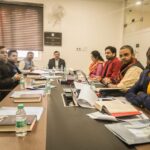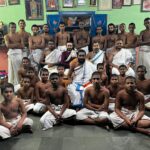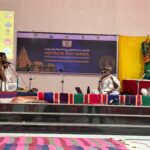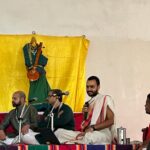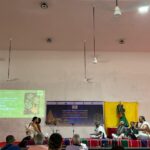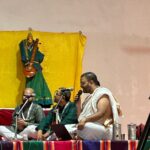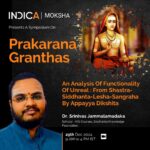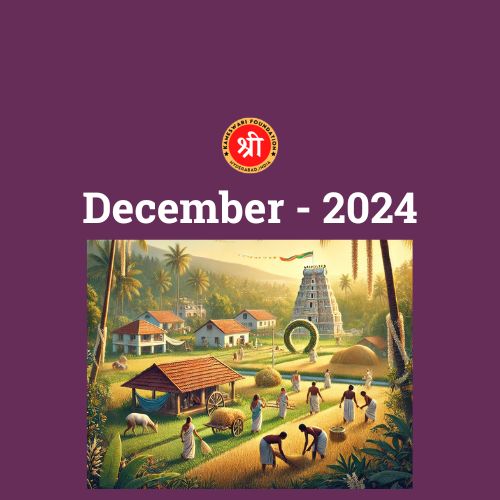
Monthly Highlights – December 24
- Posted by Sri Kameswari Foundation
- Date January 5, 2025
- Comments 0 comment
Warm Regards Everyone!!!
The month of December has been truly remarkable, offering us the opportunity to contribute meaningfully across various areas of life. From organizing medical camps and participating in forums on Indic Knowledge Systems to honoring our gurus and mentoring young minds, we have been privileged to play our part.
This journey has provided us with a well-rounded and fulfilling experience, as we engaged with essential aspects of our personal and collective growth.
Highlights of DECEMBER 2024
1.EK Spiritual Services – Medical Camp – 4-12-24
2.Welcoming Knowledge Seekers – Niral Joshi & Tapan Joshi – 6-12-24
We welcomed “Master Tapan Joshi” and his family,who has been part of our Vigyana Gurukulam course, to our Veda Pathashala campus during their short visit to India.Throughout his stay,he explored various aspects and concepts through practical approach.
All the gurukulam students,along with Tapan enjoyed an evening in a play area nearby. We once in a while arrange these outings to burst the monotony. Thanks to G Phani Kumar, Father of Siva Chaitanya and Siva Guru for organising this.
We are happy to hear from Tapan and his family that their visit to our Gurukulam has made a positive impact in their journey towards Knowledge.
3.Visit to Kavikulaguru Kalidas Sanskrit University (KKSU), Ramtek – 07-12-2024
Dr.Srinivas Jammalamadaka garu was invited to deliver a lecture as part of the Shastra Deepika Lecture Series.The topic of his lecture was the “Modern-Day Applicability of Shastras”.
Since KKSU is his former workplace,he had the privilege of reconnecting with his previous students while also engaging with the current batch.
During the session,Dr.Srinivas garu discussed the present market scenario concerning the field of Indian Knowledge Systems (IKS).He highlighted the numerous opportunities available for talented individuals who are willing to work diligently.He emphasized that developing and refining their skills through consistent effort is essential for seizing these opportunities.
4.IKSHA Samagama – 14th&15th December 2024
Dr.Srinivas Jammalamadaka garu represented the Sri Kameswari Foundation as part of the Moksha group at the Sangama ’24 event.This international confluence, organized by the Indian Knowledge Systems and Heritage Academy (IKSHA) and hosted by Gujarat University, took place on December 14th and 15th, 2024, in Ahmedabad. It brought together over 165 participants, including academics, spiritual leaders, entrepreneurs, and independent researchers.
Key Highlights:
- Objectives: The event aimed to foster collaboration between academia and industry, build confidence within the Indian Knowledge Systems (IKS) community, and create a global IKS ecosystem.
- Proceedings: Inaugural sessions featured blessings and guidance from dharma-ācāryas, followed by focus group discussions on topics such as spirituality, education, technology, and policy reform.
- Moksha Group Contributions: This group emphasized the importance of expanding the role of spiritual institutions, preserving Vedic sciences, balancing traditional and modern education, and nurturing a gurukula ecosystem to support national well-being.
- Outcomes: A key outcome of the event is an important meeting scheduled for January 7th, 2025, chaired by Prof. Shrinivasa Varakhedi, Vice-Chancellor of Central Sanskrit University, to advance the initiatives discussed during Sangama ’24.
The event concluded with actionable plans for IKS research, ecosystem building, and interdisciplinary collaboration, reinforcing the sacred core of India’s knowledge traditions.
5.Workshop on Finalizing the Final Draft of the Sanskrit Translation of Battle for Sanskrit by Rajiv Malhotra Ji – 17th to 19th December 2024
Dr.Srinivas Jammalamadaka garu participated in a three-day workshop dedicated to finalizing the Sanskrit translation of The Battle for Sanskrit by Rajiv Malhotra ji.Dr.Srinivas garu has been actively involved in this project since September 2024,contributing significantly by translating one chapter of the book and editing another.
Recognizing his expertise,the project coordinators invited Dr.Srinivas garu to join the core editorial group responsible for completing the final draft. Accordingly, the workshop was organized from December 17th to 19th, 2024, at the headquarters of the Central Sanskrit University, New Delhi.
During the workshop,Dr.Srinivas garu actively participated and offered his valuable services, contributing to the successful progression of this important initiative.
6.Visit to Veda Pathashala of Kanchi Peetham,Jambukeswaram – 25-12-2024
Dr.J.Suryanarayana garu and Dr.J.Srinivas garu visited the Veda Pathashala of Sri Kanchi Kamakoti Peetham in Thiruvanaikavil,Jambukeswaram.
This institution,over 300 years old, is renowned as Vidya Sthana,reflecting its historical significance in the pursuit of knowledge (Vidya Arjana).
Many revered pontiffs of the Kanchi Matham have undertaken their adhyayana (study) at this sacred site.
Currently, Sri Subrahmanya Ghanapati garu,along with his younger brothers is dedicated to the monumental task of reviving and preserving Vedic knowledge as Adhyapakas (teachers) at this Vedapathashala.Their efforts extend to another nearby Vedapathashala located in the village of Pazhur, further contributing to the preservation of this invaluable tradition.
7.Knowledge Enthusiasts at the 4th World Congress Of Vedic Science,SASTRA University,Thanjavur – 26-12-24
Dr.J.Suryanarayana garu & Dr.J.Srinivas garu were invited to the 4th World congress of Vedic Sciences organised by Vigyana Bharati & IKS Division, Ministry of Education at SASTRA University,Thanjavur.
It was a pathbreaking event focusing on the traditional frameworks proposed in the shastras,which are applicable in general academia.
It was a great opportunity to meet and discuss ideas related to shastras.Many renowned scholars attended this congregation.Dr.J.Suryanarayana garu proposed a Shastric framework to represent modern scientific expressions, while Dr.J.Srinivas garu presented Sustainable ecology from Indic perspective.
Summary of the Presentation “Sustainable Ecological Frameworks from Shastras” by Dr. Srinivas Jammalamadaka garu
Core Theme:
The presentation emphasizes how ancient Indic philosophical and ecological principles align with modern sustainability concepts, highlighting Dharma as the cornerstone of sustainability.
Key Concepts and Insights
1. The Interdependence of Nature and Human Life
- Referencing classical texts like the Bhagavad Gita and Chandogya Upanishad, the presentation stresses the cyclical relationship between humans, nature, and the cosmos.
- The principle of Yajna (sacrificial offerings) was presented as an ecological model wherein all beings—humans, deities, and nature—nurture one another through mutual exchanges of sustenance and care.
2. Challenges of Modern Ecological Practices
- Unsustainable practices such as deforestation, pollution, and overconsumption were compared to the “Great Acceleration” of ecological degradation.
- Infographics showed rising carbon dioxide levels, biodiversity loss, and ocean acidification, underlining the urgent need to return to sustainable frameworks.
3. Panchagni Vidya: Cosmic and Biological Cycles
- The Chandogya Upanishad’s Panchagni Vidya was explored to explain the interconnectedness of cosmic, terrestrial, and biological processes.
- Five symbolic fires (e.g., heaven, clouds, earth, humans, and women) represent the cycle of life and reproduction, demonstrating the sacred unity of life forces.
4. Philosophical Anchors for Sustainability
Dharma as Sustainability: Dharma was framed as the ecological and moral law ensuring balance within and across ecosystems.
- The Bhagavad Gita highlights the mutual nourishment principle, where humans, gods (Devas), and the environment sustain one another through respectful and responsible actions.
5. Practical Applications of Shastric Wisdom
- Ancient practices such as Yajnas were interpreted as symbolic of sustainable consumption and contributions back to nature.
- The presentation suggested modern adaptations of these practices to counter over-extraction and ensure ecological balance.
Conclusion
Dr.J.Srinivas garu underscored the importance of integrating traditional knowledge systems with modern science to foster sustainability.The Indic vision of ecological interdependence offers timeless insights into achieving harmony with nature, ensuring both environmental and spiritual well-being.
8.Celebrated Sri Chandra Sekhara Saraswati Maha Swami Aradhana at Veda Pathashala – 27-12-24
We performed the Aradhana of Sri Chandra Sekhara Saraswati Maha Swami ji,whose spiritual guidance has been an unwavering source of inspiration and strength in all our endeavors.His teachings have continually shaped and directed our mission and activities at the Gurukulam.
In reverence to Maha Swami Ji,we conducted a special puja, acknowledging his divine presence and profound influence on our lives.The students of Veda Pathashala also took part in this sacred occasion by performing Veda Pathanam,chanting the Vedic mantras with devotion, and offering heartfelt salutations to the revered Maha Swami Ji.
9.Talk by Dr.J.Srinivas garu on Shastra-Siddhanta-Lesha-Sangraha by Srimad Appayya Dikshitar at INDICA – 29-12-2024
Dr.Srinivas Jammalamadaka garu presented an insightful analysis of Shastra-Siddhanta-Lesha-Sangraha by Srimad Appayya Dikshitar,during the symposium on Prakarana Granthas conducted by INDICA Moksha.
The presentation delved into the Advaita Vedānta perspective on the functionality (arthakriyā) of unreal phenomena (mithyā).
Dr.Srinivas garu illustrated how,despite lacking ultimate reality, illusory objects—such as those in dreams, illusions, and waking experiences—can evoke genuine emotions and influence actions within their specific contexts.This analysis underscores that functionality depends on perceived reality rather than serving as proof of absolute truth.
The discourse highlighted the core Advaita assertion: while the empirical world appears purposeful and real, it is ultimately illusory. The ultimate truth, according to this tradition, is Brahman, which transcends all perceptions and illusions.
The presentation offered profound insights into the interplay between appearance, perception, and ultimate reality, enriching the symposium’s exploration of Prakarana Granthas.
10.Talk by Dr.J.Suryanarayana garu on Understanding the Diversity of Prakarana Granthas within Vedanta at INDICA – 29-12-2024
Dr.J.Suryanarayana garu delivered an enlightening lecture on Prakarana Granthas and their purpose starting with a very familiar interesting question:
Why there are so many Prakarana Granthas in Vedanta?
Here are the highlights of his discourse-
Prakarana Granthas form the foundation for understanding Vedanta and are introductory texts to the profound ideas of Vedanta.The diversity is not an accident but a conscious effort to address the needs of learners from different backgrounds and with different levels of preparation.
As aptly described by the verse:
शात्रैकदेशसम्बद्धं शास्त्रकार्यान्तरे स्थितम्।
विपश्चिताः प्रकरणं नाम ग्रन्थभेदं आहुः.
(“That which is connected to a specific part of the Shastra and serves as a means to further its purpose is called a Prakarana by the wise.”)
This definition brings out the purposeful character of the Prakarana Granthas which select those aspects of Vedanta for the learner’s benefit, without burdening him.
Prakarana Granthas are works that can be classified into three broad categories to suit the needs of different classes of audiences:
For Learners Already Initiated into Tarka Shastra (Logic and Epistemology):
Works such as Vedanta Paribhasha and Siddhanta Lesha Sangraha are chiseled specially for the person who has already mastered Tarka. These works delve deep into the logical and epistemological niceties of Vedanta, thus enabling such learners to integrate their previously acquired knowledge with Vedantic concepts.
For Learners Already Acquainted with Other Shastras (Mimamsa, Vyakarana, etc.) not Tarka:
Texts such as Vedantasara, Vedantasamgraha, Panchadashi, Vivekachudamani, and Shatashloki are addressed to students who have already studied other disciplines like Mimamsa and Vyakarana. These works bridge the gap between other traditional sciences and Vedanta, using relatable methodologies and frameworks to make advanced concepts accessible.
For Beginners with Basic Sanskrit Knowledge not any background in the shastras:
Those who have not been exposed to the Shastras, but have a rudimentary knowledge of Sanskrit, will find works like Tattvabodha and Vichara Sagara an easy and yet profound introduction to Vedanta.These works are nontechnical and explain things in a very lucid manner to create confidence and interest in the learner’s mind.
The variety in the Prakarana Granthas ensures that for every seeker—both the untrained and the one with some background—nothing is beyond his comprehension.
By making the study material align with the background of the learner,these texts avoid disengagement and allow for sustained interest in Vedanta.It is through this step-by-step approach that the sages and scholars, who authored these Granthas, have exhibited an exemplary pedagogical insight into making Vedanta more accessible to all without losing any of its depth and rigor.The system is not only conducive to learning by an individual but ensures continuity in the generations passing on the Vedantic knowledge.
Hence, choosing the appropriate Prakarana Grantha would be the very step for success in any Vedantic path taken by anyone, toward positive and fulfilling experiences.
You may also like
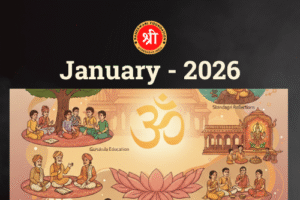
Monthly Highlights – January 26

Monthly Highlights – December 25
